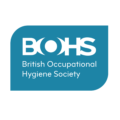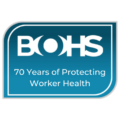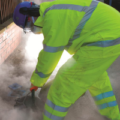BOHS Return to Work Guidance highlights important post-lockdown issues
The British Occupational Hygiene Society, the Chartered Society for worker health protection has highlighted areas of risk that have not been addressed by government guidance on a safe return to work. In guidance released last week https://www.bohs.org/return-to-work-guidance/ to help its members and leaders of organisations tackle the challenges of returning to work after lockdown, it addresses safety-critical issues, as well as those which are specific to tackling the challenges of the virus.
The Society is concerned that businesses must focus on the potential health risks of opening premises and restarting processes after such a protracted shutdown. The importance of the issue has been highlighted by the recent disaster in India, where the restarting of a plant after COVID-19 led to fatalities.
Many businesses had to shut down premises in a hurry and with no idea how long it would be before they started up again. That means that all of the processes that are there to keep people safe from harmful exposures to chemicals, biological agents, and other hazards have not been in operation. A proper plan and risk assessment is needed before starting up processes and bringing people back to work,
said Kelvin Williams, President of the Society.
“Our members are experts in preventing harmful exposures. We wanted to provide usable and practical advice to help people properly assess the risks. This sort of advice needs to be written by people who actually understand real working environments.”
The Society was the first in Britain to recognize the broader issues of health risks arising from the lockdown, writing to the science minister, Amanda Solloway, at the beginning of the lockdown to highlight the need to plan for the return to work. On the 23rd March, the CEO, Kevin Bampton wrote to Mrs. Solloway to say, “The unprecedented shutdown of plants, workplaces and processes designed to be in continual operation will give rise to really serious challenges.” The letter went on to highlight the sorts of concerns that needed to be addressed.
“Systems will be prone to biological infestation such as legionella, seals and protections will degrade, corrosions and instability will be a feature of chemical storage, carcinogenic dusts will accumulate. All of these things need to be planned for on an industry-specific basis so as to avoid a second wave of acute and chronic ill-health and a stuttering restart of the British economy because of health and safety concerns.”
The Society remains concerned that these issues are not an integral part of the risk assessments outlined in the government’s guidance provided about a safe return to work. BOHS convened an Expert Group of industry specialists, drawing upon national and international best practice. Many of the experts are actively involved in bringing Britain’s industry back online.
“Our focus has been on providing a usable framework for leaders, responsible persons and our members to help take a strategic view of the problem and plan before people are on the ground,” said Society Secretary, Alex Wilson. “We don’t want the return to work to be slowed by people having to check for risks after people have been deployed and we certainly don’t want the sort of outcomes we have seen in India. Of course, we need to focus on ensuring workplaces cannot become hotspots for COVID-19 transmission, but there are other real dangers to address and we wanted to highlight this to our members and to others.”
The guidance is freely available at https://www.bohs.org/return-to-work-guidance/ and the Society welcomes feedback and queries from businesses and organisations to help make it better. BOHS, which has been at the forefront of protecting Britain’s workers and is best known for its work in eliminating asbestos, legionella and dust exposure in the workplace will also be offering other online resources in the coming weeks.





